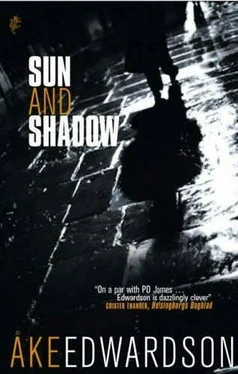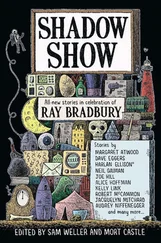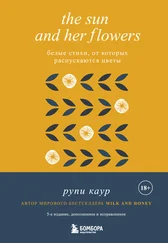He felt a warmer gust of wind and looked up. The clouds were breaking. Half of the sky was blue. It had opened up on the far horizon, over Africa. The sea was changing color, as if it were being lit from underneath.
Now the sun was visible, and seemed to be racing at breakneck speed through the remains of clouds resembling flakes of snow. Winter thought about the cold weather back home in Sweden: it would soon be upon them. Once again he thought about his child.
He could feel the heat on his head. As the sun returned he could appreciate its incredible strength even more clearly thanks to the preceding chill. The sudden surge of light made him feel strangely elated, as if he were starting to hope that the holiday season was back, that the sun had returned for good. He tried to avoid seeing symbolism in that as well. The sun is life, but it is also death.
As he stood there more and more people arrived to slump down on a hamaca and adjust the sombrilla to shield them from the sun. One man was building a sand sculpture about ten feet tall, representing a sphinx and a pyramid. This is the same sand as they have in Africa, Winter thought, blown here over the Mediterranean.
A street musician sat down on a chair a couple of feet away from Winter, put on his sandals, and launched into the first of the day’s flamenco songs: Adiós Graaaanaaaada, Graanaada Mííía. Winter dropped a few pesetas into the guitar case and went back to his car.
When he arrived at Room 1108 he found it empty. His stomach turned over.
Why the hell hadn’t she phoned? She took the mobile with her wherever she went, after all.
He went into the corridor and said his father’s name to the woman who hadn’t been standing there when he arrived, and she pointed to the exit and said: “Cuidados Intensivos, ” with an appropriately worried expression on her face. Calm down, Winter thought. This is only what you expected when you came here yesterday.
He found his mother in the corridor outside the ward.
“I haven’t had a chance to phone,” she said.
“How is he?”
“Stable, they say. He’s stable now.”
“What happened?”
“He had breathing problems. And his pulse.”
“What do the doctors say?”
“Dr. Alcorta wants to wait a bit before forming an opinion.”
“This fucking Alcorta! Where is he? I want to talk to him.”
“He’s operating.”
“On Dad?”
“No. Another patient.”
“Where is Dad?”
“He’s asleep. I can take you to him.”
They went into the intensive care ward. Everything was white and clean. There were no windows here looking out onto a graveled courtyard and dusty palm trees swaying in the wind. But there was a window with a view of the room where Winter could see his father in a bed surrounded by tubes and machines. He looked as if he were part of a medical research project.
“We’re not allowed to go in now,” his mother said.
“No.” He looked at her. In this intense light she appeared as ill as his father, possibly even worse, as her thin face was incapable of hiding anything. Winter could smell the smoke clinging to her dress and thought about the leaflet he still had in his pocket. La vida. Paciencia. Life and patience, in that order.
“How long is he going to have to stay here?”
“I don’t know, Erik.”
“How long have you been here now without a break? Three days? Four? Can’t you go back to the house? I’ll stay with him today and tonight.”
“Not now, Erik.”
“I think you need to get away from here for a while. Just a few hours, if you prefer that. You can take my rented car.”
“I don’t think I’m fit to drive just now.”
“Take a taxi, for Chr-”
She looked at him. Her eyes more red than white.
“Maybe I should, I suppose. Just for a bit.”
“I’ll stay here,” Winter said. “Go on, off you go.”
Bartram and Morelius were back at the station with a double portion of sweet-and-sour chicken from Ming’s down the road. They sat in the coffee room, halfheartedly watching a crime film on the box.
“That could have been us,” said Bartram, nodding at the television.
“The detectives, you mean?”
“They could have been us. The problem solvers. Think of all those women they get as perks.”
“We solve enough problems as it is. For ladies as well.”
“You know what I’m getting at.”
“I’m afraid so.”
“Meaning what?”
“I’m not sure I have the strength to listen.”
Bartram said nothing, just poured more chili and soy sauces over the rice. The film had finished and was followed by a commercial for diapers. A baby was rolling around on a blanket and was then lifted up by his smiling mother.
“What a nice mom,” Bartram said.
“As long as the cameras are there, at least.”
“A nice mom,” Bartram said again. He chewed, swallowed, and poured on some more soy sauce.
“Your rice is black now,” Morelius said. “Black rice.”
‘A nice lady,“ Bartram said. ”A nice lady. A nice mom.“
Morelius tried not to listen, to concentrate on something else. The wall. The next commercial. The wall again. The last greasy lump of chicken. Bartram kept on and on.
“Nice… lady,” Bartram said.
“Put a sock in it now.”
“What’s the matter?”
“Put a sock in it.”
“But for Chrissakes… What have I said?”
“PUT A GODDAM SOCK IN IT!” screamed Morelius, standing up and walking over to the sink, where he threw his foil tray into the bin. He wished he could have stuffed Bartram inside at the same time.
Morelius hurried out of the room, into the bathroom, and sat down on the seat. Images were flashing through his head. Bits of conversation intruded, movements, faded, there again. The conversation he’d had with Hanne… when was that? Weeks ago? Two weeks? It had been a mistake to go to her. It was only a few of the young cops who went to see the vicar, and then only when… when…
“I can’t stop thinking about it,” he’d said.
“It takes time,” Hanne Ostergaard had said.
“I have to be patient, is that it?”
“That’s not the word I would use.”
“I try not to think about it, but sometimes it’s too… hard.”
“Is there nobody you can… talk to about… your experiences?”
“No. You mean, am I living with somebody? No.”
“What about your colleagues?”
Morelius thought about Bartram and Vejehag. Neither had been with him at the time. They wouldn’t understand. The others? The ones who arrived on the scene later? No. They’d been too late.
“No,” he said again. “I was with a new recruit and he was useless after no more than a minute. Just leaned against the car and threw… didn’t feel well.” He looked at her. “I don’t know why I didn’t do the same.”
“We all react in different ways,” she’d said.
“I had a job to do,” was his reply.
He really did have a job to do.
They’d arrived at the scene just a couple of minutes after the crash. It was another occasion, not the one in the tunnel.
Glass and metal thrown fifty yards in all directions. Sleet, early for the time of year. Slippery road surface. His colleague had stood on a foot as he got out of the car. Just one foot. In a shoe. Rendered him totally incapable of anything. He’d radioed in and could hear the ambulances and fire engines in the distance even before he’d finished the call.
Somebody might have been screaming from inside the pile of twisted metal on the highway. Screaming louder and louder. Louder than the ambulances that still hadn’t arrived. Where the hell were the ambulances? This was their job. He couldn’t do anything, but he’d rushed over to the screams to see if he could help. Then he couldn’t hear them anymore.
Читать дальше












